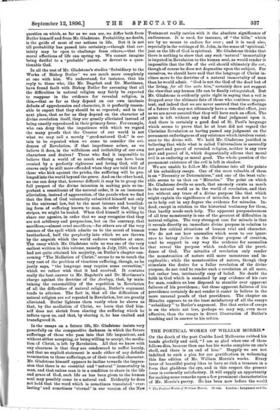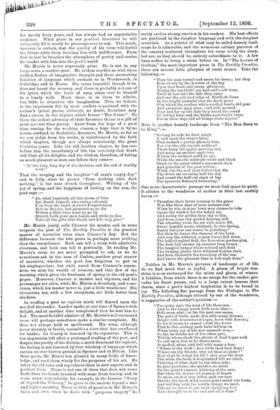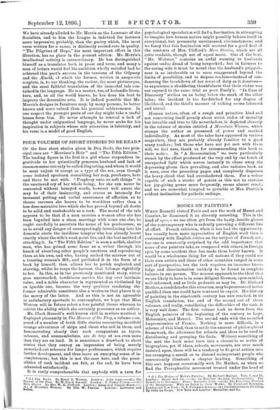THE POETICAL WORKS OF WILLIAM MORRIS.*
ON the death of the poet Crabbe Lord Melbourne rubbed his hands gleefully and said, "I am so glad when one of these fellows dies, because then one has his works complete on one's shelf, and there is an end of him." Happily we are not indebted to such a plea for our gratification in welcoming this fine edition of Mr. William Morris's works. Every lover of beautiful poetry likes to have so rich a treasure in a form that gladdens the eye, and in this respect the present issue is eminently satisfactory. It will supply an opportunity for making some remarks upon a few prominent characteristics of Mr. Morris's poetry. He has been now before the world • The Poetical Works of William Morris. 10 role. London : Lonirmans and Co.
for nearly forty years, and has always had an appreciative audience. What place in our poetical literature he will ultimately fill it would be presumptuous to say. This much, however, is certain, that the quality of his verse will forbid the future critic from treating him with indifference. From first to last he breathes the atmosphere of poetry and carries the reader with him into the poet's world.
Mr. Morris is never supremely great. He is not in any large sense a creative poet. He seldom startles us with those sudden flashes of imaginative thought and those astonishing felicities of language which enchant us in Wordsworth, in Coleridge, and in Keats. His verse, beautiful though it be, does not haunt the memory, and there is probably not one of his lyrics which the lover of song sings over to himself in a lonely walk. Much there is in them to admire, but little to stimulate the imagination. This, we believe, is the impression felt by most readers acquainted with the author's lyrical pieces, although, no doubt, Socialists may find a charm in the rhymes which favour " The Cause." To them the ardent advocacy of their favourite theme is a gift of more account than poetry. Apart from the hope of a good time coming for the working classes, a hope that is by no means confined to Socialistic dreamers, Mr. Morris, as far as we can judge from his works, is uninfluenced by the faith which inspires, though not always consciously, the great Christian poets. Like the old heathen singers, he has ever heford him the uncertainty of life, the certainty that death will blast all its delights, and the wisdom, therefore, of taking as much pleasure as men can before they come-
" To the long, long day of the darkness and the end of worldly work."
That the weeping and the laughter "of man's empty day" end in folly, since he passes "from nothing unto dark nothing," is the note struck throughout. Writing of the joy of spring, and the happiness of looking on the sun, the poet says :—
" Ah, what begetteth all this storm of bliss
But Death himself, who crying solemnly E'en from the heart of sweet Forgetfulness Bids us Rejoice, lest pleasureless ye die.
Within a little time must ye go by.
Stretch forth your open hands, and while ye live Take all the gifts that Death and Life may give."
Mr. Morris justly calls Chaucer his master, and in some respects the poet of The Earthly Paradise is the greatest
master of narrative verse since Chaucer•'s day. But the difference between the two poets is, perhaps, more striking than the resemblance. Both can tell a story with admirable clearness, and both can tell it poetically. In reading Mr. Morris's verse we are never prompted to ask, as we do sometimes ask in the case of Crabbe, another great master of narrative, whether the poet has forgotten to put on his singing-robes ; but while saved from Chancer's coarse- ness, we miss his wealth of humour, and that dew of the morning which gives the freshness of spring to the old poet's pages. Moreover, Chaucer is incisive and vigorous, and his personages are alive, while Mr. Morris is desultory, and some- times, which his master never is, just a little wearisome. His characters, too, with a few exceptions, are little better than shadows.
In reading a poet so copious much will depend upon the mood of the reader. Landor spoke at one time of Spenser with delight, and at another time complained that he sent him to bed. The most faithful admirer of Mr. Morris's well-sustained verse will perhaps sometimes make a similar complaint. He does not always hold us spellbound. His song, although never slovenly or feeble, resembles a river that has overflowed its banks ; its beauty is lessened by its expansion. This is the impression left after a prolonged reading of the poet, and despite the purity of his diction, a merit dominant throughout, the feeling is not lessened by that witchery of language which carries us over barren ground in Spenser and in Milton. Like those poets, Mr. Morris has gleaned in many fields of know- ledge, and used them wisely for the purposes of his art. He takes the old tales and reproduces them in new aspects and in poetical form. There is not one of them that does not come forth from his hands invested with some fresh beauty, and in some cases, very notably, for example, in the famous " Story of Sigurd the Volsung," he gives to the ancient legend a new and higher meaning. There is little of passion in Mr. Morris's tales, and even when be deals with "gorgeous tragedy" he
rarely excites strong emotion in his readers. His best effects are produced in the simplest language and with the simplest materials. As a painter of what may be called homely land- scape he is admirable, and the numerous cabinet pictures of the country scattered throughout his verse vivify the story, but are, as they should be, entirely subordinate to it. A few lines suffice to bring a scene before us. In "The Lovers of Gudrun," the most important poem in The Earthly Paradise, there are several little glimpses of rural scenes. Take the following :— " Then the man turned and smote his horse; but they
Rode slowly by the borders of the bay Upon that fresh and sunny afternoon, Noting the sea-birds' cry and surf's soft tune, Until at last into the dale they came And saw the gilt roof ridge of Herdholt flame In the bright sunlight over the fresh grass
O'er which the restless white-woolled lambs did pass
And querulous grey ewes ; and wide around, Near and far up the dale they heard the sound Of lowing kine. and the blithe neat-herd's voice, For in those days did all things there rejoice."
Here is another homely landscape from " The Man Born to be King":— " So long he rode he drew anigh
A mill upon the river's brim, That seemed a goodly place to him, For o'er the oily smooth millhead There hung the apples growing red, And many an ancient apple-tree Within the orchard could he see, While the smooth millwalls white and black Shook to the great wheel's measured clack And grumble of the gear within ; While o'er the roof that dulled that din The doves sat crooning half the day And round the half-cut stack of hay The sparrows fluttered twittering."
One more characteristic passage we must find space to quote. It alludes to the wanderers at anchor in their last earthly haven :-
"Therefore their latter journey to the grave Was like those days of later autumn-tide
When he who in some town may chance to bide,
Opens the window for the balmy air, And seeing the golden hazy sky so fair, And from some city garden hearing still The wheeling rooks the air with music fill, Sweet, hopeful music, thinketh, Is this Spring, Surely the year can scarce be perishing ?
But then he leaves the clamour of the town, And sees the withered, scanty leaves fall down,
The half-ploughed field, the flowerless garden-plot:, .1
The dark full stream by summer long forgot, .
The tangled hedges where relaxed and dead The twining plants their withered berries shed,
And feels therewith the treachery of the sun,
And knows the pleasant time is well-nigh done."
Neither in Mr. Morris's pictures of landscape or of life do we find much that is joyful. A gleam of bright sun- shine is soon exchanged for the mists and gloom of winter. A fatalism, from which there is no escape for the reader, per- vades his finest poems, and to a large extent lessens their charm, since a poet's highest inspiration is to be found in joy. The following fine passage from the Prologue to The Earthly Paradise, although uttered by one of the wanderers, is suggestive of the author's position:-
• '
Two gates unto the road of life there are,
And to the happy youth both seem afar,—
Both seem afar ; so far the past one seems, The gate of birth, made dim with many dreams, Bright with remembered hopes, beset with flowers; So far it seems he cannot count the hours That to this midway path have led him on
When every joy of life now seemeth won,—
So far, he thinks not of the other gate, Within whose shade the ghosts of dead hopes wait To call upon him as he draws sneer, Despoiled, alone, and dull with many a fear, • Where is thy work ? how little thou bast done !
Where are thy friends, why art thou so alone ? '
How shall be weigh his life ? slow goes the time
The while the fresh dew-sprinkled hill we climb, Thinking of what shall be the other side; So pass perchance the minutes we abide On the gained summit, blinking at the sun ; But when the downward journey is begun No more our feet may loiter, past our ears Shrieks the harsh wind scarce noted midst our fears, And battling with the hostile things we meet, Till, ere we know it, our weak shrinking feet Have brought us to the end and all is done."
We have already alluded to Mr. Morris as the Laureate of the Socialists, and to him the League is indebted for lectures more impressive, probably, than the poetry which, like most verse written for a cause, is distinctly second-rate in quality. "The Pilgrims of Hope," his most important effort in this direction, has no place in the present edition. Mr. Morris's intellectual activity is extraordinary. He has distinguished himself as a translator both in prose and verse, and many a man of letters would feel his ambition wholly satisfied had he achieved this poet's success in the versions of the Odyssey and the Xneid, of which the former, written in anapaestic couplets, is, to our thinking, the raciest, the most picturesque, and the most faithful translation of the immortal tale con- tained in the language. He is a master, too, of Icelandic litera- ture, and, as all the world knows, he has done his best to improve the decorative arts. It is indeed possible that Mr. Morris's designs in furniture may, by many persons, be better known and more valued than his poetical achievements. In one respect the younger poets of our day might take a useful lesson from him. He never attempts to conceal a lack of thought under enigmatical language, he never seeks for his inspiration in subjects whose sole attraction is lubricity, and his verse is a model of good English.




































 Previous page
Previous page